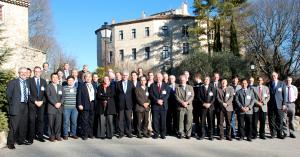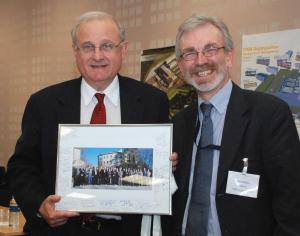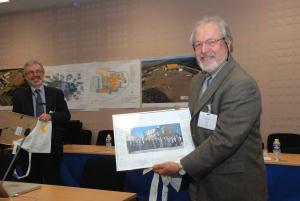International Tokamak family meets in Cadarache
17 Dec 2010
-
Sabina Griffith
At its 13th meeting, the members of the International Tokamak Physics Activity (ITPA) joined together with representatives of the major fusion facilities to discuss the coordination of experimental programs on an international scale in support of ITER physics R&D.
This week the international tokamak family, joined under the umbrella of the International Tokamak Physics Activity (ITPA), came together in Cadarache to discuss the high-priority R&D program in preparation for ITER operation and how to best address issues such as ELM control, disruption mitigation, heating technologies and testing of plasma-facing materials.
Resonant magnetic perturbation coils for example, a technique pioneered on DIII-D for suppressing edge localized modes (ELMs), will be implemented in many of the bigger tokamaks. Pellet and massive gas injection are promising methods to mitigate disruptions that will be further studied in the coming months and years. On the materials side: ASDEX-Upgrade has pioneered the use of all-tungsten plasma-facing surface tiles to find out more about the behaviour of this material in a fusion environment; JET is preparing for experiments with a tungsten divertor and beryllium first wall (as foreseen for ITER); Alcator C-Mod will experiment with an all-tungsten divertor; and TEXTOR will perform tests with a tungsten limiter.
Resonant magnetic perturbation coils for example, a technique pioneered on DIII-D for suppressing edge localized modes (ELMs), will be implemented in many of the bigger tokamaks. Pellet and massive gas injection are promising methods to mitigate disruptions that will be further studied in the coming months and years. On the materials side: ASDEX-Upgrade has pioneered the use of all-tungsten plasma-facing surface tiles to find out more about the behaviour of this material in a fusion environment; JET is preparing for experiments with a tungsten divertor and beryllium first wall (as foreseen for ITER); Alcator C-Mod will experiment with an all-tungsten divertor; and TEXTOR will perform tests with a tungsten limiter.
The two youngest "kids on the block," the Korean tokamak KSTAR and its Chinese counterpart EAST, will also be pursuing investigations of plasma-wall interactions under stationary conditions, exploiting the long-pulse capabilities of their superconducting magnet systems.
After seven years acting as Chairman of the ITPA, Ron Stambaugh from the US stepped down. On behalf of the panel's members, David Campbell from the ITER Directorate for Plasma Operations handed him a photo of the "family."
On this occasion, the ITPA joined together with representatives of the major fusion facilities who collaborate via the IEA Implementing Agreement for Cooperation on Tokamak Programs to discuss the coordination of experimental programs on an international scale in support of ITER physics R&D. A wide-ranging program of experiments was agreed that aimed at tackling the major challenges listed above, as well as probing some of the subtilities of tokamak plasma behaviour in greater depth.
The committee also paid tribute to Erol Oktay from the US Department of Energy, a long-standing contributor to ITER activities who is retiring after a career spanning 39 years in fusion research—many of those dedicated to promoting international collaboration on fusion.
At this 13th meeting of the ITPA Coordinating Committee, the members expressed their deep appreciation to longtime Chairman Ron Stambaugh from the US, who has led the panel for the past seven years and who has now decided to step down. Yutaka Kamada of JAEA takes over as the new Chair. The committee also paid tribute to Erol Oktay from the US Department of Energy, a long-standing contributor to ITER activities, who is retiring after a career spanning 39 years in fusion research, many of those years having been dedicated to promoting international collaboration on fusion.
Many thanks to David Campbell and Michiya Shimada for their contributions to this article.




